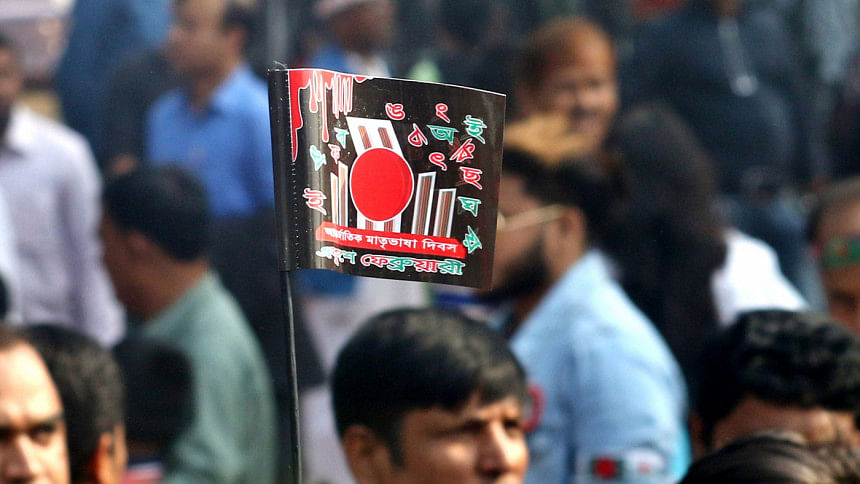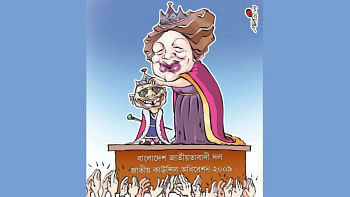Celebrating Common Threads

February 21 is an important day for our country and for the world. This is the day when we remember the sacrifice that brave martyrs made for the Bengali language and culture. It is also the day that people around the world celebrate linguistic and cultural diversity. But while the nation and the world think of today as International Mother Language Day, it has a different meaning for me. To me, it is a day that is inextricably intertwined in my mind with my father, Syed Muazzem Ali. This is particularly so this year as it is the first such day without him. The first of many Ekusheys without him, I expect.
My father was part of the extraordinary team that made sure this day would be commemorated globally. When Prime Minister Sheikh Hasina and the government of Bangladesh made a formal proposal for the International Mother Language Day to UNESCO, he was posted at the time as the Bangladesh Ambassador to France and Permanent Representative to UNESCO. He did his utmost to make sure that the proposal would be accepted, obtaining support from partner countries. Ultimately, the resolution was passed unanimously so that the entire world recognises the importance of linguistic and cultural diversity on the same day as we remember the sacrifice a generation made for our language. I know that he felt very fulfilled and fortunate to have been part of the team that made it happen. I too feel grateful that he could be part of it, and after his passing, for me, this could be a part of him and his legacy.
The second reason that I associate him with this day is remembering the many discussions we had at the time about cultural and linguistic diversity. It was December 1999, soon after the UNESCO resolution had passed. I was then an undergraduate studying mathematics and economics, and was visiting my parents over winter break. During one of our many long conversations, my father spoke about the importance of making sure that different languages and cultures survive together, and that these voices weren't lost in the waves of globalisation. I remember questioning him why it was important to preserve a language if it weren't being spoken.
"Wouldn't it be more useful to just let the languages perish and for us all to coordinate on one common language?" I remember asking. He responded: "Son, economics cannot capture everything. There is a different value to linguistic and cultural diversity." But just like on many other occasions, he accepted with a chuckle that his children held a different point of view.
It turns out that both he and I may have been wrong: there is a value to linguistic and cultural diversity, as my father would argue, but this can be captured by economics. What I did not realise then, but do so now, is that at least two aspects of language have economic value.
The first is that the vocabulary we use to express ideas necessarily has an effect on the ideas that we have. What might be black or white in one language is expressed in shades of grey in another. To the extent that innovation often calls upon people to think of the world differently, perhaps a world where we speak a multitude of languages will foster having a multitude of ideas.
The second is a clear externality effect that I was ignoring: the choice of preserving a language or not is felt not only by the current generation but also by future generations. These generations do not have a say in whether the language is passed onto them, but in choosing to not pass that language on to them, they experience a loss of literature, fiction, culture, and ideas. They lose the chance to glimpse the beauty of an idea expressed in one language that is obscured by every other.
The final reason that I associate my father with the International Mother Language Day is that there are aspects of him, and some I see in his generation, as being quintessentially Bengali. There is a certain charm, a whimsical nature to the humour and jokes, a ray of sunshine… all of these were qualities of him that drew inspiration from his love of Bangla literature. There was a style of speech and conversation that made him at home in Dhaka, in Sylhet, in Kolkata—anywhere where Bangla was being spoken—that made him less at home in San Diego or Boston. Bangla was a source of energy for him, and he was a source of energy for others. As someone who primarily thinks in English, I know that this is something I cannot recreate or reproduce for my children; I may not even be able to explain it to them at this stage. But with my father's loss, I feel a loss of that energy that came from his inherent Bengali-ness.
My father didn't sacrifice his life for Bangla in the way that the martyrs did. But he put his life to making sure that their sacrifice would be remembered. And today, I remember both those who gave their lives for Bangla, and my father who drew so much of his life's energy from Bangla.
Syed Nageeb Ali is a Professor of Economics at Pennsylvania State University, USA. He is the son of late Syed Muazzem Ali, a former foreign secretary and career diplomat of Bangladesh.

 For all latest news, follow The Daily Star's Google News channel.
For all latest news, follow The Daily Star's Google News channel. 



Comments